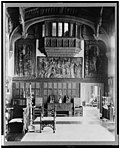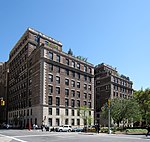Henry P. Davison House
1917 establishments in New York CityBuildings and structures completed in 1917Diplomatic missions in ManhattanDiplomatic missions of ItalyFederal architecture in New York City ... and 10 more
Georgian architecture in New York (state)Historic district contributing properties in ManhattanHistoric district contributing properties in New York CityHouses completed in 1917Houses in ManhattanItaly–United States relationsManhattan building and structure stubsNew York City Designated Landmarks in ManhattanPark AvenueUpper East Side

The Henry P. Davison House is a mansion located on 690 Park Avenue and 69th Street on the Upper East Side of Manhattan, New York City. It was constructed for the banker Henry P. Davison in 1917 by Walker & Gillette in the Neo-Georgian style. Since 1952, the building has been the location of the Consulate General of Italy.The House was designated a landmark by the New York City Landmarks Preservation Commission in 1970. It was added to the National Register of Historic Places in 1980.
Excerpt from the Wikipedia article Henry P. Davison House (License: CC BY-SA 3.0, Authors, Images).Henry P. Davison House
Park Avenue, New York Manhattan
Geographical coordinates (GPS) Address External links Nearby Places Show on map
Geographical coordinates (GPS)
| Latitude | Longitude |
|---|---|
| N 40.769166666667 ° | E -73.965555555556 ° |
Address
Henry P. Davison House
Park Avenue
10021 New York, Manhattan
New York, United States
Open on Google Maps






